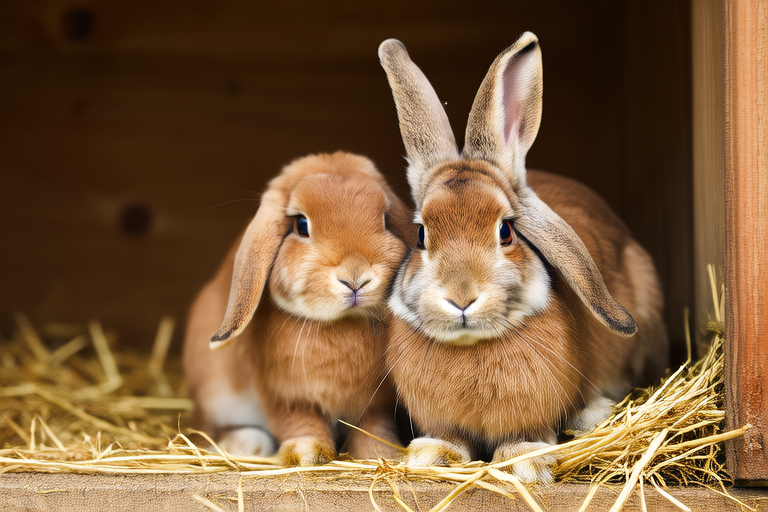Adorable Lop Rabbits: The Ultimate Pet for Quiet Companionship
Welcome to the enchanting world of lop rabbits! These delightful creatures have captured the hearts of many with their distinctive floppy ears and gentle demeanor. If you’re considering adopting a pet that provides quiet companionship and boundless affection, look no further than lop rabbits. This article will guide you through everything you need to know about these charming animals, from their unique appearance and character to their care requirements and how to bond with them.
The Appeal of Lop Rabbits
Lop rabbits are easily recognizable due to their long, drooping ears that give them a soft, cuddly appearance. Their ears can grow up to 7 inches (18 cm) long, and they come in various colors, adding to their charm. Despite their playful and curious nature, lop rabbits are known for their calm and gentle temperament, making them excellent companions for people who prefer a quieter pet. Unlike some other breeds, lop rabbits don’t bark, meow, or chirp; they simply provide serene company.
Suitability as Pets
For those seeking a peaceful and affectionate pet, lop rabbits are an ideal choice. They are highly social animals and thrive on interaction with their human caregivers. Their quiet nature ensures that they won’t disturb neighbors or disrupt your daily routine, making them perfect for apartment living or families with young children. Additionally, lop rabbits are intelligent and can be trained to perform simple tricks, enhancing the bond between pet and owner.
Care Requirements
Diet
Proper nutrition is essential for the health and well-being of your lop rabbit. A balanced diet primarily consists of hay, which should make up the majority of their food intake. Fresh vegetables and fruits can be given in moderation, but it’s crucial to introduce new foods gradually to avoid digestive issues. Pellets formulated specifically for rabbits should also be provided in limited quantities to ensure they get all necessary nutrients. Always provide fresh water in a spill-proof bottle or bowl.
Housing
Creating a comfortable and safe living space for your lop rabbit is vital. An indoor cage or hutch is recommended, offering protection from predators and harsh weather conditions. The enclosure should be spacious enough to allow movement and include areas for eating, sleeping, and playing. Bedding made of straw or shredded paper provides comfort and absorbs moisture. Regular cleaning of the enclosure is necessary to maintain hygiene and prevent infections.
Grooming Needs
Lop rabbits require regular grooming to keep their coats healthy and free from mats. Brushing their fur at least once a week helps remove loose hair and prevents hairballs. Bathing is generally unnecessary unless absolutely required, as it can stress the rabbit and strip natural oils from their skin. Trimming nails every few weeks is also important to prevent overgrowth and discomfort.
Common Health Issues and Prevention
Like any pet, lop rabbits are susceptible to certain health problems. One common issue is dental disease, which can lead to difficulty eating and pain if left untreated. Providing hay and chew toys encourages gnawing, helping to naturally file down teeth. Another concern is gastrointestinal stasis, where the digestive system slows down or stops functioning. Ensuring a fiber-rich diet and plenty of exercise can help prevent this condition.
Mites and fleas are external parasites that can infest rabbits, causing discomfort and skin irritation. Regular inspection and prompt treatment with vet-approved products are key to managing these pests. Vaccinations against common diseases are also available and should be discussed with your veterinarian.
Training and Bonding
Training your lop rabbit can be a rewarding experience that strengthens your bond. Positive reinforcement techniques, such as offering treats and praise for desired behaviors, work best. Teaching commands like ‘come’ or ‘sit’ can enhance communication and make handling easier. Spending quality time together through play and interaction fosters trust and affection.
One effective way to bond with your rabbit is through structured play sessions. Use toys designed for rabbits, such as tunnels, balls, and chew toys, to stimulate their minds and bodies. Playing fetch or hide-and-seek can be particularly enjoyable activities that promote engagement and strengthen the relationship.
Conclusion: Why Lop Rabbits Make Perfect Pets
In summary, lop rabbits are charming, gentle, and affectionate pets that offer quiet companionship. Their calm demeanor and low-maintenance care requirements make them suitable for various living situations, including apartments and homes with children. By providing proper nutrition, adequate housing, and regular grooming, you can ensure your lop rabbit lives a happy and healthy life. Training and bonding activities deepen the connection between pet and owner, creating a lasting relationship filled with love and joy.
If you’re looking for a pet that brings warmth and tranquility into your home, consider adopting a lop rabbit. These adorable animals are sure to become cherished members of your family, providing endless companionship and happiness. With their gentle nature and minimal fuss, lop rabbits truly embody the ideal companion for anyone seeking a calm and loving friend.
